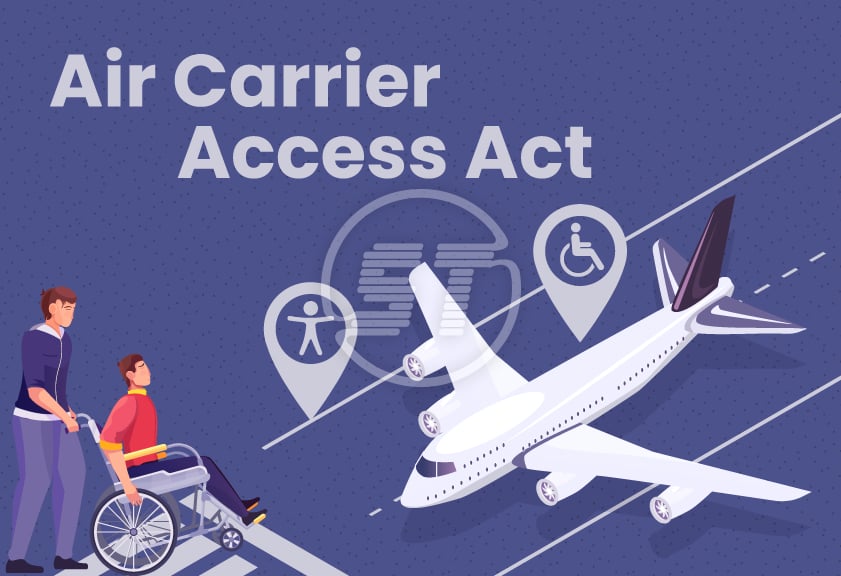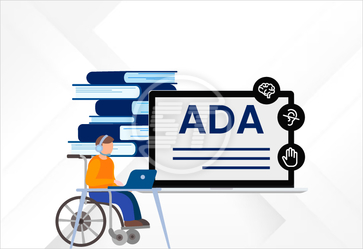Enacted in 1986 and amended recently in 2023 by the Department of Transportation (DoT), the Air Carrier Access Act (ACAA) is made to prohibit discrimination against disabled travellers in air carriers. The amendment is focused on addressing the accessibility of air carrier websites, kiosks, and service animals. The rule is applied to all airlines that operate to and from the United States to protect the rights of disabled passengers.
The ACAA includes rules to make sure that passengers with disabilities have access to all facilities available at airports and aircrafts so that they can travel solo as well without any inconvenience.
Read along to learn more about ACAA.
ACAA's history of evolution and consequences of non-conformance
The US Department of Transportation published a rule to the ACAA in November 2013 in the Federal Register stating that all air carriers must have accessible websites to eliminate discrimination against disabled individuals.
December 2015 was the deadline for all core online travel services to be made accessible.
In June 2016, one amendment happened in ACAA, requiring all public-facing pages of an air carrier’s website to be made accessible and conform to Web Content Accessibility Guidelines (WCAG) 2.0.
Violation of Air Carrier Accessibility Act can turn out as an expensive offence for air carrier organizations since each violation is subject to a $27,500 USD penalty for both domestic and foreign flights. Thus, there must be a regular accessibility update, and remediation work is expected to maintain the website’s consistent user experience.
General requirements of ACAA along with digital accessibility suggestions
Airlines cannot discriminate against disabled travellers unless there are some safety threats.
Aircrafts are expected to have accessible design and facilities.
Airports and air carriers should assist in boarding, storing, and retrieving carry-on items, navigating, and deplaning.
If there are passengers with hearing or vision impairments on board, there must be accessible information and communication systems.
Any number of disabled people can board the flight.
If a disabled user can travel alone, they are allowed to travel solo, and airlines cannot charge extra for any given assistance.
- Battery-operated devices such as scooters, wheelchairs, or a segway must have simple and handy software systems.
Digital accessibility requirements for airlines:
All communication emails sent to travellers ought to be accessible.
Devices that are placed to assist passengers with disabilities such as menu cards, safety instructions manuals, kiosks, in-built screens, etc. must be easy to use and their content should adhere to WCAG standards thereby disabled travellers can independently perform essential activities during their journey.
The primary website of the airlines should conform to WCAG 2.0 level AA success criteria and if any page or element is non-conforming, there should be some accessible alternative to understand them. The website accessibility is crucial for ticket booking, cancellation, rescheduling, boarding, etc.
Foreign carriers may ask for a waiver if applicable laws preclude the carrier from complying with the provision of some part of their website or applications. The language to apply for a waiver is English.
The waiver may be granted based on foreign laws applicable to the websites.
Likewise, US carriers may also apply to the Department for a determination that they are providing an operational alternative to disabled users.
Every carrier operating to and from the US must update their policies, practices, and procedures with time as per upgraded WCAG standards.
However, if modifications are imposing undue burden on the air carrier organization, then they are not required to make the changes.
Primary website testing is mandatory to ensure there are no key issues that may cause trouble for disabled travellers.
Read the complete document of Code of Federal Regulation (Title 14 CFR Part 382) to learn more about the Air Carrier Access Act.
Benefits of ACAA in digital accessibility
The Air Carrier Access Act (ACAA) addresses digital accessibility by helping create accessible websites, mobile apps, in-flight entertainment, self-service kiosks, and communications. The integration of digital accessibility with ACAA leads to several benefits, such as:
Accessible digital products and services empower disabled travellers to travel independently and perform all required arrangements on their own like flight bookings, check-ins, etc.
Air carriers with accessible updated websites and apps help people with disabilities to access real-time flight information, schedules, other important announcements, etc.
Accessibility ultimately improves disabled users’ participation in air travel and promotes inclusivity.
Digital accessibility in airlines not only uplifts user experience but also fulfils legal requirements. That helps these airline companies to reduce the risk of litigation and brand image damage.
YOU MAY ALSO LIKE: Cost to Make Website ADA Compliant
Inclusivity can help air carrier organizations to soar higher!
ACAA is a much-needed incorporation in digital accessibility. However, airlines are struggling as of now to meet all the suggestions and recommendations due to several reasons. And to fill the gaps, air carrier organizations, airport authorities, and governments should work together. Moreover, continuous awareness campaigns and ACAA training for resources that are using digital technologies directly are essential.
With ACAA, air carriers are gradually improving their accessibility status and helping disabled individuals to travel with ease. The aviation industry can meet accessibility goals by prioritizing digital inclusivity.
So, plan and process to embrace accessibility!
Are your business website and other digital assets WCAG compliant? Or are you looking for guidance on ACAA digital accessibility standards? With a team of experts, we provide full website accessibility services including audit, strategy, design, development, remediation, and support services that comply with accessibility regulations such as WCAG 2.0, 2.1, 2.2, Section 508, 08, and ACAA within your budget. To further the cause of digital accessibility and inclusivity, please do not hesitate to reach out at [email protected] or request a website accessibility service quote.


